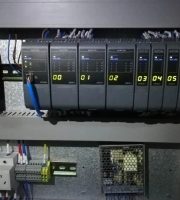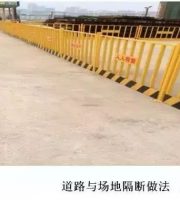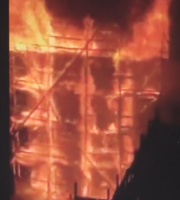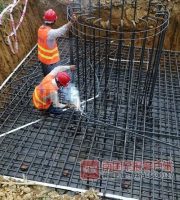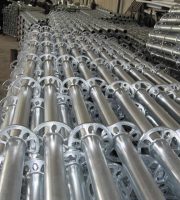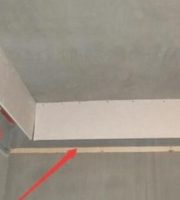Generally speaking, the size of the range of water collecting wells largely depends on the actual water output of the pump.
It should be noted, however, that in the process of material preparation, the number, power and model of water pumps selected by the staff shall meet the requirements that the total drainage shall be 1.5 ~ 2 times greater than the total water inflow of the foundation pit.
In addition, in the process of artificial well point precipitation, if the proportion of clean water in the extracted water is very large, it can be directly discharged into the urban groundwater pipeline.
2、 Slow down the precipitation rate to slow down the precipitation rate: in sandy silt, the influence range of precipitation can reach more than 80m, and the precipitation curve is relatively gentle.
In order to prevent fine soil particles from being brought out during pumping, the filter screen can be selected according to the particle size of the soil.
During setting out construction, The drainage effect should be considered in detail, so as to better increase the scope of foundation pit.
The length of the filter pipe at the reinjection well point shall be greater than that at the dewatering well point.
Construction preparation.

And the more commonly used pumping equipment should also be effectively applied.
2、 The importance of sump drainage for foundation pit drainage technology in construction is self-evident.
Reinjection technology is to drill a row of well points between the dewatering well points and the buildings to be protected.
If the underground compensation is not done well, the buildings are prone to truncation and collapse.
In addition, in the process of open drainage of water collection, constructors should pay attention to the setting of corresponding waterproof facilities, so as to more effectively avoid the problem of foundation subsidence.
In the application of open drainage method of water collection, the construction personnel can better arrange the work through the drainage in the foundation pit.
In addition, in the application of recharge and drainage method, if the soil decreases because of the groundwater level, it will lead to the corresponding reduction of water content and consolidation compression.
It can not be operated at will to avoid oxidation or damage due to errors in operation.
3、 Artificial well point dewatering artificial well point dewatering is the top priority of foundation pit drainage technology in building construction.
The centrifugal pump valve can also be adjusted in the well point system precipitation process to slow down the pumping speed.
In addition, during the application of open drainage method of water collection, the staff should pay attention to the interception of surface water around the construction area, and effectively intercept the nearby surface water by setting water retaining dike.
The drainage of water collecting well is applicable to the geological environment where the groundwater level is lower than the bottom elevation of the foundation pit and the groundwater is not rich.
Problems needing attention in foundation pit drainage construction technology in construction engineering I.
If it is sewage, corresponding filtration shall be carried out.
In addition, ensuring the thickness and construction quality of the sand filter layer around the well point pipe can also effectively prevent land subsidence caused by precipitation..
When using reinjection well points, the distance between reinjection well points and dewatering well points should not be less than 6m, and the spacing of reinjection well points should be determined according to the spacing of dewatering well points and the plane position of protected buildings.
4、 Recharge and drainage method recharge and drainage method is one of the core contents of foundation pit drainage technology in building construction.
In addition, in the process of drainage of the water collecting well, the construction personnel should pay attention to ensuring that the foundation can maintain the corresponding dry condition and get reasonable reinforcement support.
Therefore, a certain number of water level observation logs should be set near the reinjection well point system, and a certain number of observation points should be set for buildings at the same time; Make observation records to adjust the reinjection water volume in time.
In the process of application of sump drainage, constructors should pay attention to the setting of sump around the foundation pit, which should be based on reasonable discharge.
The reinjection well point should enter 1m below the stable precipitation surface and be located in the soil layer with good permeability.
While pumping water from the dewatering well points, a certain amount of water is injected into the soil through the reinjection well points to form a water barrier curtain, so as to prevent or reduce the loss of groundwater from the protected buildings outside the reinjection well points and keep the groundwater level basically unchanged, In this way, the ground settlement will not be caused by the increase of foundation self weight stress due to precipitation.
On this basis, it can promote the effective improvement of the application level of foundation pit drainage technology in construction.
In order to effectively ensure the smooth construction of the foundation pit, when setting the water collecting well, it is necessary to set the height of the well surface to be about 40cm higher than the drainage of the foundation pit, and an annular gap needs to be left between the diameter and diameter of the water collecting well, so as to better fill the filter material and play a good anti-seepage effect.
This is because the buildings are getting higher and higher, which will increase the load of the buildings.
setting of drainage ditch in the process of foundation pit drainage construction of construction engineering, when setting up drainage ditch, we need to pay attention to the relationship between drainage ditch and longitudinal slope.
Impact of waterproof precipitation on the surrounding environment first, the impact of recharge technology precipitation on the surrounding environment is caused by the loss of groundwater in the soil.
On this basis, it can promote the continuous progress of the application efficiency of foundation pit drainage technology in construction.
Therefore, corresponding protective measures should be taken when it is applied, so as to finally promote the continuous progress of the application accuracy of foundation pit drainage technology in building construction.
Prevent excessive reinjection from causing water to penetrate into the foundation pit and affecting the construction, and prevent too small reinjection from causing the groundwater level to drop out of control and affecting the reinjection effect.
We not only need to ensure its water seepage stability, but also contact the relationship between seepage volume and longitudinal slope to confirm the cross section of drainage ditch.
Although the drainage technology in foundation pit is not a constructive technology in the construction industry, as a compensatory measure, it is increasingly important in the construction of construction projects in recent years.
In addition, the construction personnel shall pay attention to ensure that the groundwater wells are used to discharge the water during the drainage of the water collecting wells.
In addition, in the process of artificial well point dewatering, constructors should pay attention to keeping the soil in the pit dry through dewatering, which is conducive to construction, and can consolidate the soil and effectively prevent quicksand.
In this process, it should be noted that the application of this foundation pit drainage method requires the construction of an earth embankment close to 1m nearby to intercept the surface water.
At the same time, there is less water inflow or less surface water replenishment, which means that the foundation pit, foundation trench excavation, foundation structure construction, waterproof construction and drainage and precipitation construction during backfill of general industrial and civil buildings.
In addition, the application of recharge and drainage method will often lead to uneven settlement of the surrounding ground and settlement and cracks of adjacent buildings.
open drainage method of water collection is the foundation and premise of foundation pit drainage technology in building construction.
General vacuum well point dewatering equipment and technology can be adopted for reinjection well points, and only a small amount of equipment such as reinjection water tank, gate valve and water meter can be added, which is easy for general construction units to master.
Therefore, the well point pipe can be lengthened to slow down the precipitation rate and prevent excessive settlement.
During the application of this drainage method, the construction personnel should carry out the corresponding drainage work through vacuum well point, jet well point or tube well.
In the process of reinjection drainage method, the construction personnel shall ensure that the drainage work will not have a great impact on the surrounding environment.
2、 Selection of pumping equipment after the completion of pipe well setting, it is necessary to select pumping equipment scientifically and reasonably and select appropriate pumping equipment according to the relevant provisions of foundation pit drainage construction of construction engineering, which is not only conducive to the smooth progress of pipe well pumping operation, but also can effectively judge the water level of pipe well by observing the pumping content, It should be noted that when the filter is used, it needs to be used according to the construction specifications and standards.
Foundation pit drainage technology in building construction I.
Finally, it can promote the continuous improvement of the application reliability of foundation pit drainage technology in building construction.
The well point pipe spacing can also be increased on the side adjacent to the protected building, and the pumping can even be suspended when necessary.
